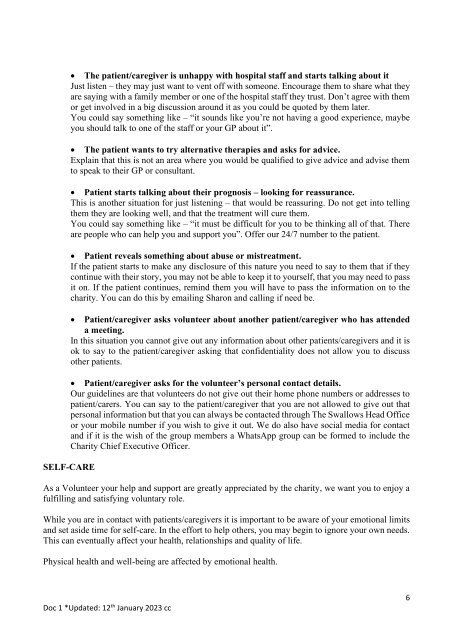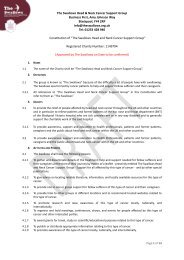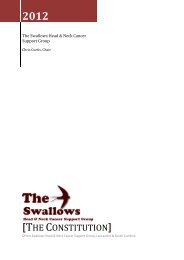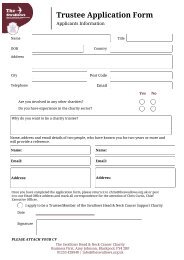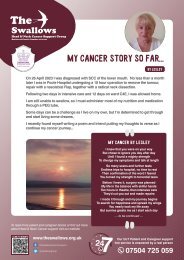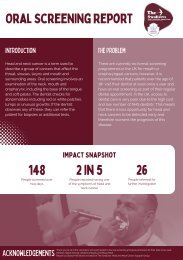1. Guidelines Best Practice 2023
This will help you the Patient/Caregiver lead with running the support group.
This will help you the Patient/Caregiver lead with running the support group.
Create successful ePaper yourself
Turn your PDF publications into a flip-book with our unique Google optimized e-Paper software.
SELF-CARE<br />
• The patient/caregiver is unhappy with hospital staff and starts talking about it<br />
Just listen – they may just want to vent off with someone. Encourage them to share what they<br />
are saying with a family member or one of the hospital staff they trust. Don’t agree with them<br />
or get involved in a big discussion around it as you could be quoted by them later.<br />
You could say something like – “it sounds like you’re not having a good experience, maybe<br />
you should talk to one of the staff or your GP about it”.<br />
• The patient wants to try alternative therapies and asks for advice.<br />
Explain that this is not an area where you would be qualified to give advice and advise them<br />
to speak to their GP or consultant.<br />
• Patient starts talking about their prognosis – looking for reassurance.<br />
This is another situation for just listening – that would be reassuring. Do not get into telling<br />
them they are looking well, and that the treatment will cure them.<br />
You could say something like – “it must be difficult for you to be thinking all of that. There<br />
are people who can help you and support you”. Offer our 24/7 number to the patient.<br />
• Patient reveals something about abuse or mistreatment.<br />
If the patient starts to make any disclosure of this nature you need to say to them that if they<br />
continue with their story, you may not be able to keep it to yourself, that you may need to pass<br />
it on. If the patient continues, remind them you will have to pass the information on to the<br />
charity. You can do this by emailing Sharon and calling if need be.<br />
• Patient/caregiver asks volunteer about another patient/caregiver who has attended<br />
a meeting.<br />
In this situation you cannot give out any information about other patients/caregivers and it is<br />
ok to say to the patient/caregiver asking that confidentiality does not allow you to discuss<br />
other patients.<br />
• Patient/caregiver asks for the volunteer’s personal contact details.<br />
Our guidelines are that volunteers do not give out their home phone numbers or addresses to<br />
patient/carers. You can say to the patient/caregiver that you are not allowed to give out that<br />
personal information but that you can always be contacted through The Swallows Head Office<br />
or your mobile number if you wish to give it out. We do also have social media for contact<br />
and if it is the wish of the group members a WhatsApp group can be formed to include the<br />
Charity Chief Executive Officer.<br />
As a Volunteer your help and support are greatly appreciated by the charity, we want you to enjoy a<br />
fulfilling and satisfying voluntary role.<br />
While you are in contact with patients/caregivers it is important to be aware of your emotional limits<br />
and set aside time for self-care. In the effort to help others, you may begin to ignore your own needs.<br />
This can eventually affect your health, relationships and quality of life.<br />
Physical health and well-being are affected by emotional health.<br />
Doc 1 *Updated: 12 th January <strong>2023</strong> cc<br />
6


